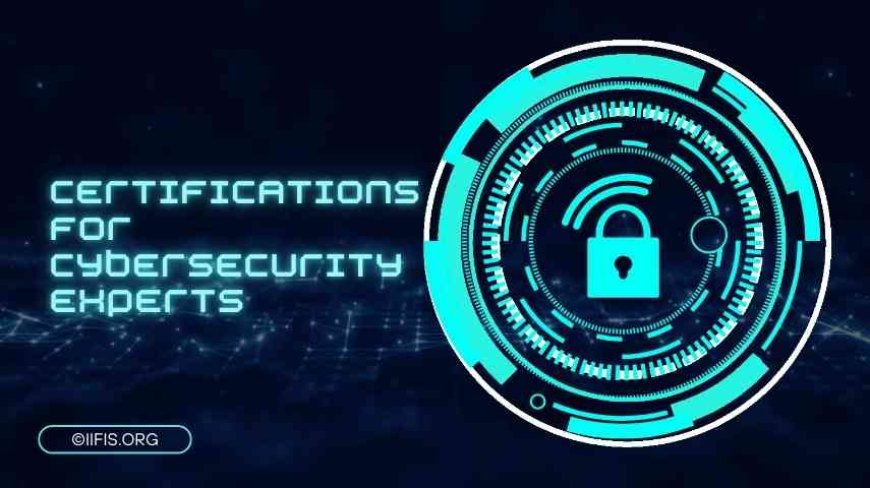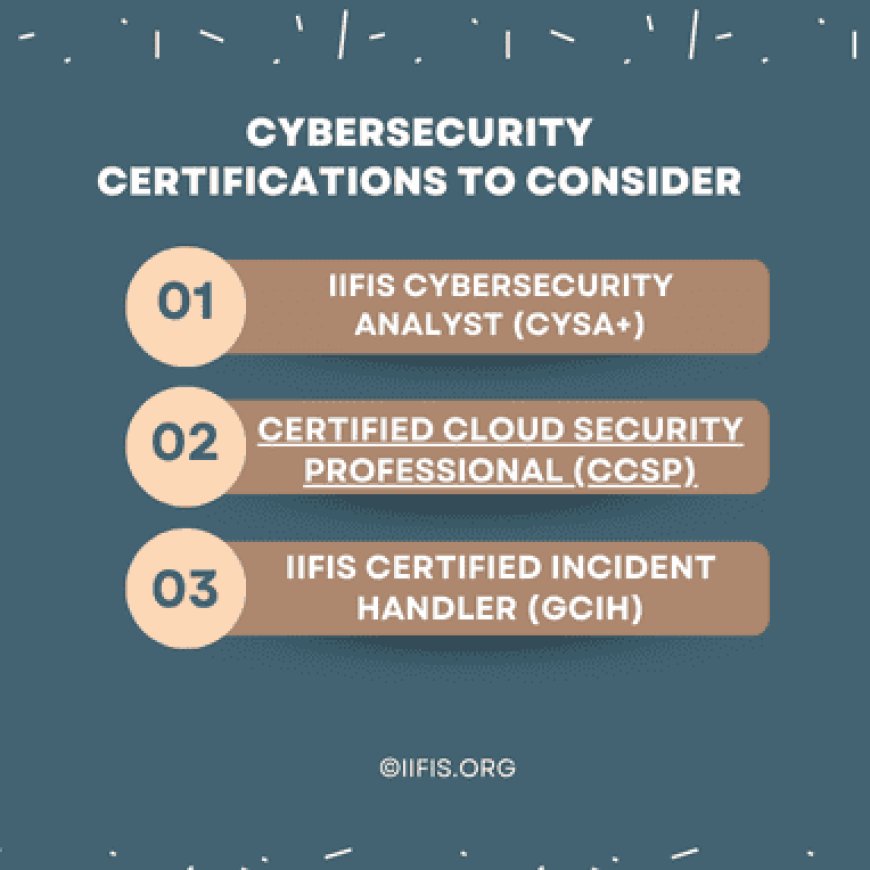Best Certifications for Cybersecurity Experts
Explore top programs that cover essential skills in threat detection, ethical hacking, network security, and risk management, designed to enhance your expertise and boost your professional value in the cybersecurity industry.

In today's digital world, cybersecurity is no longer just an added layer of defense, it's an absolute necessity. With cyber threats constantly evolving, the demand for skilled cybersecurity professionals has surged, and the right certifications can set you apart in this competitive field. Whether you're just starting in cybersecurity or looking to advance your career, obtaining a certification can validate your expertise, enhance your credibility, and open doors to new opportunities. In this guide, we’ll explore the best certifications for cybersecurity experts, from foundational credentials to advanced specializations, to help you find the ideal path to bolster your skills and accelerate your career.
Why Cybersecurity Certifications Matter
cybersecurity certifications have become essential for professionals aiming to stand out and stay ahead. These certifications validate an individual’s skills and knowledge, acting as tangible proof of expertise to employers and clients. This validation is crucial in an industry where trust, reliability, and up-to-date technical know-how are key.
-
Certifications Validate Skills and Knowledge
Cybersecurity certifications offer a structured and thorough way to assess a professional’s capabilities. Certifications like Certified Information Systems Security Professional (CISSP), Certified Ethical Hacker (CEH), or CompTIA Security+ cover various areas, from ethical hacking to network security. Completing these programs not only verifies specific technical skills but also ensures that professionals possess a foundational understanding of cybersecurity best practices. For employers, this helps them distinguish between candidates who have hands-on, practical experience and those who may lack formal training. -
Career Advancement and Salary Growth
Many professionals pursue certifications to elevate their career prospects, and for good reason. Certified individuals often find that their credentials open doors to higher-paying roles and advanced positions. Studies consistently show that certified cybersecurity professionals earn a premium, with salary increases reaching 10-15% higher than non-certified peers in some cases. In addition to financial incentives, certifications can be a stepping stone for promotions, with certifications like CISSP or CISM being prerequisites for managerial and executive cybersecurity roles. -
Keeping Up with Industry Standards
The cybersecurity field is constantly evolving, with new threats, tools, and techniques emerging regularly. Certifications require continuing education or periodic renewal, compelling professionals to stay up-to-date with the latest industry standards. Many certification bodies, such as (ISC)² or ISACA, provide ongoing training resources, webinars, and conferences, helping certified professionals stay on top of current trends, regulatory changes, and advanced technologies. This ongoing learning ensures that certified cybersecurity experts are well-prepared to tackle current challenges and that their knowledge is relevant in an ever-changing landscape.
Top Cybersecurity Certifications for 2024
With the increasing sophistication of cyber threats, cybersecurity certifications are essential for validating knowledge, enhancing career paths, and meeting industry demands. This list of top certifications for 2024 has been curated based on industry demand, the value of certifications in specific career paths, and relevance to evolving technologies like cloud and ethical hacking. Each certification listed provides a pathway to advancing cybersecurity expertise, from foundational skills for beginners to specialized skills for experts.
1 Entry-Level Certifications
CompTIA Security+
-
Overview and Benefits: CompTIA Security+ is a globally recognized entry-level certification, offering foundational knowledge in security concepts, network security, and risk management. Covering essentials like cryptography, identity management, and threat detection, it equips newcomers with skills crucial for a variety of cybersecurity roles.
-
Ideal for Newcomers: This certification is perfect for those entering the cybersecurity field, as it requires no prior experience and is often considered the first step in a cybersecurity career. It’s valued by employers as a reliable indicator of foundational cybersecurity knowledge.
Certified Ethical Hacker (CEH)
-
Focus on Ethical Hacking Skills: CEH focuses on teaching ethical hacking techniques and methodologies. Covering penetration testing, attack detection, and vulnerability assessment, it is ideal for those interested in identifying and fixing security vulnerabilities.
-
Essential for Entry-Level Penetration Testers and Security Analysts: This certification suits those pursuing roles in ethical hacking, penetration testing, and vulnerability assessment, offering practical skills for newcomers interested in offensive security.
2 Mid-Level Certifications
Certified Information Systems Security Professional (CISSP)
-
Known as the "Gold Standard" for Cybersecurity: CISSP is widely recognized as the benchmark for cybersecurity management roles. Covering eight domains of cybersecurity, from risk management to asset security, it certifies advanced knowledge across various areas of cybersecurity.
-
Best Suited for Experienced Security Professionals Aiming for Managerial Roles: CISSP is designed for mid-level professionals with several years of experience. It’s ideal for those targeting roles in security management, policy-making, and senior security positions, with a focus on both technical and managerial aspects.
Certified Information Security Manager (CISM)
-
Focuses on Management Skills within the Cybersecurity Domain: CISM emphasizes information security governance, risk management, and compliance. It combines security management and strategic planning, bridging the gap between cybersecurity and business objectives.
-
Ideal for Those Aspiring to Lead Security Programs: Best suited for professionals who aim to advance into leadership roles, CISM is tailored for security managers and directors looking to shape and implement security strategies within their organizations.
Certified Cloud Security Professional (CCSP)
-
Focus on Securing Cloud Environments: CCSP focuses on cloud security, covering topics like cloud architecture, data security, and risk management in cloud environments. With the rise in cloud adoption, it is increasingly important for professionals managing cloud-based data.
-
Highly Valuable Given the Rise in Cloud Adoption: As organizations continue to migrate to the cloud, CCSP is ideal for security professionals seeking specialized skills in securing cloud infrastructures. It’s designed for those who want to manage or design cloud security architectures and strategies.
3 Advanced and Specialized Certifications
Offensive Security Certified Professional (OSCP)
-
Intensive and Highly Technical, with a Focus on Penetration Testing: OSCP is known for its rigorous, hands-on approach to penetration testing. It emphasizes real-world scenarios and practical skills in offensive security.
-
Widely Respected Among Cybersecurity Experts: OSCP is highly regarded for its technical depth and difficulty. It is recommended for advanced professionals aiming to specialize in penetration testing and offensive security roles, as it demonstrates a high level of practical expertise.
GIAC Security Expert (GSE)
-
One of the Most Challenging Certifications: GSE is known as one of the most rigorous and comprehensive cybersecurity certifications. It covers an extensive range of cybersecurity domains, including advanced network security, threat detection, and incident response.
-
Designed for Top-Level Experts: GSE is intended for highly experienced professionals seeking to validate their skills as top-level cybersecurity experts. It’s ideal for those who want to demonstrate elite proficiency across multiple areas of cybersecurity.
Certified Information Systems Auditor (CISA)
-
Ideal for Professionals Focusing on Auditing, Control, and Assurance: CISA is designed for professionals who focus on auditing, control, and information systems assurance. It covers the assessment, governance, and protection of information systems.
-
Valuable for Compliance and Risk Management Roles: This certification is suitable for those in governance, compliance, or risk assessment roles. CISA validates skills in auditing information systems, ensuring data integrity, and assessing risks.
Cybersecurity Certifications to Consider

IIFIS Cybersecurity Analyst (CySA+)
-
Emphasis on Behavioral Analytics to Prevent Cybersecurity Threats: The CySA+ certification focuses on using behavioral analytics to detect and prevent cybersecurity threats, going beyond traditional defensive practices by emphasizing proactive threat detection.
-
Best for Analysts Focusing on Threat Detection: CySA+ is ideal for cybersecurity analysts and professionals who aim to specialize in threat intelligence and detection. It covers a range of skills, including monitoring, analyzing data, and identifying vulnerabilities, making it valuable for roles centered on defensive security.
Certified Cloud Security Professional (CCSP)
-
Specialized for Cloud Security and Architecture: The CCSP certification focuses specifically on cloud security principles and practices. It covers cloud architecture, data security, compliance, and operational aspects, making it highly relevant as organizations increasingly adopt cloud-based solutions.
-
Ideal for Professionals in Cloud Security Roles: CCSP is designed for IT and security professionals who work with cloud environments and wish to gain expertise in securing these infrastructures. This certification provides the knowledge needed to manage and protect data, applications, and systems in cloud-based platforms.
IIFIS Certified Incident Handler (GCIH)
-
Focuses on Handling and Responding to Incidents: GCIH specializes in incident response, covering methods for handling and mitigating security incidents. It equips professionals with skills to respond effectively to active threats, detect vulnerabilities, and contain incidents.
-
Beneficial for Those Interested in Incident Response Roles: This certification is valuable for professionals interested in roles focused on incident response, such as security analysts and incident responders. GCIH emphasizes practical skills in threat detection, containment, and recovery, ensuring readiness in real-world scenarios.
How to Choose the Right Certification for Your Career Path
Align Certifications with Career Goals and Skills
-
Career Goals: Identify your target role. For entry-level, go for foundational certifications like CompTIA Security+. Mid-career pros can aim for CISSP or CCSP, while advanced roles benefit from OSCP or GSE.
-
Skill Level: Choose a certification that matches your experience to avoid overwhelming challenges.
Balance Study with Work
-
Set Study Goals: Break your study plan into manageable parts and integrate study with work where possible.
-
Leverage Employer Support: Use any available resources like funding or study time your company provides.
Embrace Continuous Learning and Stack Certifications
-
Stay Current: Cybersecurity evolves quickly; continuous education ensures relevance.
-
Stack Certifications: Combining certifications (e.g., CySA+ with CEH or CISSP with CISM) can deepen expertise and boost career options.
Choosing the right certification keeps your career on track, aligns with your growth, and builds expertise essential in cybersecurity.
Cybersecurity certifications are essential in today’s job market, where cyber threats are growing, and skilled professionals are in high demand. Certifications from reputable organizations, like IIFIS, validate your skills, enhance your credibility, and open doors to career advancement and industry connections.
Assess your career goals, align them with the right certification path, and take the first step toward expanding your cybersecurity expertise. Investing in certification is a powerful move for anyone looking to make an impact in the cybersecurity field.
























